When life bounced waiter who had just embarked on a new career in nursing, his ‘titanium heart’ pulled him through
When he was 41, Chad Folkers realized he needed to get sober, go back to school and find a new career. After eight years of full-time work as a waiter and full-time classes, he graduated from nursing school with honors.
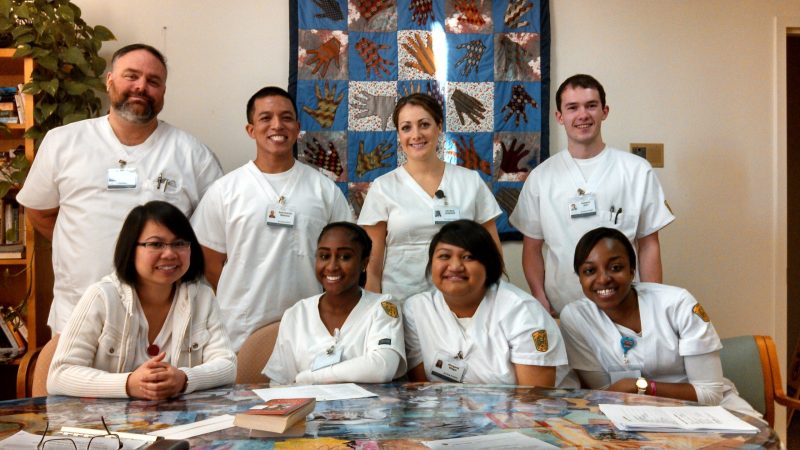
But within a short time, the future he imagined was derailed – twice.
Just after finishing his studies, he was diagnosed with lymphoma and a spinal tumor, then paralyzed from the waist down following an emergency surgery. He was hospitalized for nearly a year, but he used the time to study for – and pass — the licensing exam required of nurses.
Regrouping from cancer, Folkers found an apartment and landed a position at a caregiving nonprofit that seemed ideal.
But, a year into the job and as his new life seemed to jell, the pandemic forced his employer to lay him off. But Folkers, now 54, hasn’t given in to despair. He’s now in a South of Market studio apartment and learning to manage life in a wheelchair.

“I feel like God gave me a titanium heart,” he said. “If paralysis, cancer, homelessness, addiction and unemployment couldn’t get me down, I am meant to be here.”
Re-inventing himself
Folkers said he had a difficult time as a teenager and young adult. He struggled with substance abuse, had a fraught relationship with his family, and kept his identity as a gay male a secret for years.
He was adopted upon his birth in Sioux City, Iowa, in 1967. He was one of three children the couple adopted. “We always knew from the beginning we were adopted, and I remember being bullied in school because of that.”
The family was solidly middle class: “Our home was beautiful; we each had our own room,” he said. But as his relationship with his mother deteriorated, he started drinking in his early teens.
By the time he was 19, he’d entered the first in a string of treatment programs. “I got sober at 19 and I left my family; I just disappeared into the ether.”
After ignoring them for a few years, he accepted a suggestion from a therapist to come out to his mother. “I sat her down on her crocheted afghan and she had this smile, this softness on her face and she said, ‘I know’ and I suspect she knew all the time she had a gay son.”
In his 20s and 30s, he crisscrossed the country “hoping to liberate myself from my problems, to run from them.” He found odd jobs, including a stint as a model. “I was the hot-dude prop decorating the set; the clothes were on the girls,” he said.
He moved from Nebraska to Los Angeles and back, and arriving in San Francisco in 2006, hoped it would be a place to re-invent himself. He struggled but managed to get sober and got a good-paying job waiting tables.
Popular at the hospital
Folkers has a lively sense of humor and brown eyes not averse to a direct gaze. An inveterate people watcher, he notices two young men gazing into each other’s eyes at a cafe and said, “Don’t they make a cute couple,” then moved on to his choice to become a nurse.
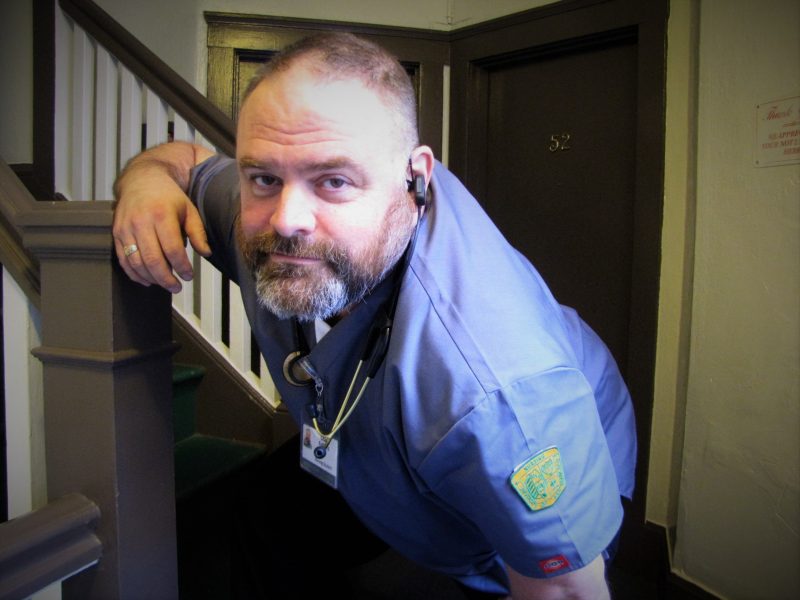
Aiming for a career in medicine, Folkers enrolled in City College of San Francisco. He took a wide variety of pre-med courses, including anatomy, physiology, chemistry and pharmacology. As required of prospective nursing students, he volunteered at a hospital. San Francisco General assigned him to the book cart. “I loved it,” he said, and apparently the patients loved him. “The nurses would call and ask, ‘Are you coming in today? Patients are asking for you.”
He noticed, though, that some, with seemingly nothing to do, were declining to take a book or magazine. He soon realized they couldn’t see well enough to read. So, he bought a box of cheap reading glasses to offer and many accepted. That was when, he said, he realized “nursing might be on the menu for me.”
He developed a strong bond with nurses and patients, some of whom were there for months. It never crossed his mind he might become a longterm, in-patient himself.
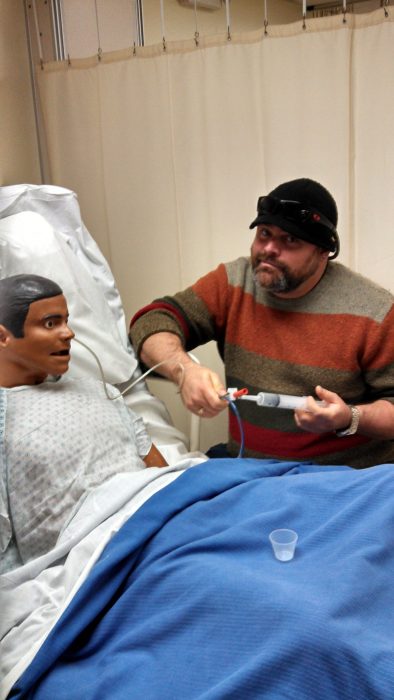
He graduated in May 2016 from the University of San Francisco’s School of Nursing – still sober. That August, he submitted his application to take the state licensing exam for registered nurses.
He was about to turn 50, and his future seemed promising. He hoped to go to work in the Pediatric Intensive Care Unit, where he had his most rewarding clinical rotations. “I think there is a part of me, the still broken little boy in me, who is compelled to make sure that other children get the care and love they need.”
But on the night of Nov. 7, 2016 – he remembers the exact date because he missed voting in the next day’s presidential election – he took an Uber to General’s emergency room in tremendous pain.
Cancer, and more
He was diagnosed with diffuse, large B-cell lymphoma and a tumor on his spinal cord. He was rushed into surgery. When he came to, he was told he would need chemotherapy and follow-up treatment, but he still had the use of his legs.
He was transferred to an oncology unit to prepare for chemotherapy. Seven days later, he had a second emergency surgery; an internal hemorrhage had gone undiagnosed.
“When I transferred myself from my hospital bed to the surgery gurney, I had mobility, I had legs,” he said. “I woke up in the ICU with no legs. No mobility. Paralysis. The end.”
He couldn’t go home; his apartment was now inaccessible. He had to hire a moving company sight unseen to pack his stuff and store it. “I had no choice. I threw down the credit card, and a friend was my eyes and ears at my place when the movers came.”
Medi-Cal covered his hospitalization and continued treatment. His doctors decided to keep him in the hospital for three months of chemo, then transferred him to Laguna Honda Hospital and Rehabilitation Center. Overnight, he became a long-term patient.
“I spent endless hours sitting peacefully in the meditation garden at the edge of the neighboring woods,” he recalled, and the petting zoo stocked with pigs, ducks, geese, and goats. “I loved to visit and commune with these creatures.”

He would take his wheelchair up to Mollie Stone’s grocery to shop, a steep uphill workout. He learned to use public transport and had some panicky moments when Muni lines were stalled or out of service.
He spent much of his time studying and taking practice tests for the RN licensure exam. In October 2017, he stole away from Laguna Honda, aided by a wheelchair and a friend, to take the exam at a testing center downtown. He passed.
Though grateful for the eight months at Laguna Honda that gave him the space and peace to study, he said living there was not the healing experience he needed, and he got no support for his efforts to stay sober. Laguna Honda was recently deemed “substandard” by a federal licensing agency and is threatened with closure.
Rejoining the world
Brilliant Corners, a nonprofit that places disabled people in housing, found him a studio apartment in a concierge building, with elevators and a rooftop garden, easily accessible to Trader Joe’s, Whole Foods and other stores in his South of Market neighborhood.
He moved in, almost one year after becoming paralyzed. “That was a dark moment, very dark, sitting alone in the apartment with just a bed they’d set up, and 25 boxes of poor-quality hospital catheters. They’d bought me four bowls and plates, and I had two towels and two washcloths I’d brought from Laguna Honda. All my stuff was in storage.”
As he learned to accept his life, he knew that finding a job would help return a sense of normalcy. But he was pessimistic about his chances: a recent RN grad with no experience, in a wheelchair.
But he persisted and found a job reviewing patient charts to see if treatment plans complied with federal and state standards. A nearby bus line stopped near his apartment and whisked him to his job in North Beach. What a simple pleasure to be working again, he thought.
But the job was confusing and harder than he expected. He quit after just 90 days.
Next, he started working as a scheduler with Homebridge, which matches caregivers with disabled, home-bound clients. As an RN and someone who’d had his own revolving door of caregivers, he was passionate about this work.
He was in a groove: a man with a job he cared about and a cool apartment he had decorated and made home. But his job was eliminated, to save money when the pandemic hit. “I was OK with that. I couldn’t get COVID with my issues.”
A Brighter Future

Folker’s life is calmer now. He has a cordial relationship with his parents back in Iowa. “I’ve come a long way with my mom; I believe in forgiveness.”
He has a new, state-of-the-art wheelchair that he is eager to try out on some trails. He’s on disability now, but wants to go back to work, cautiously waiting out the pandemic.
On a sunny July morning, he took a ride through Mission Bay Park where a young woman approached him with her dog. “Would you mind very much if my dog came up to your wheelchair?” she asked. “I am trying to get her comfortable and not afraid of people in wheelchairs. Please say no if it’s not OK.”
Folker smiled. “Of course, it’s OK. I love dogs,” reaching out to the young Vizsla. The dog was calm and easy as Folker spoke quietly to her.
The young woman beamed. “Dogs and children have always liked me. I am thinking I might like to work with kids with disabilities,” Folker mused. And he turned his wheelchair around, gave a wave and powered down the path toward home.



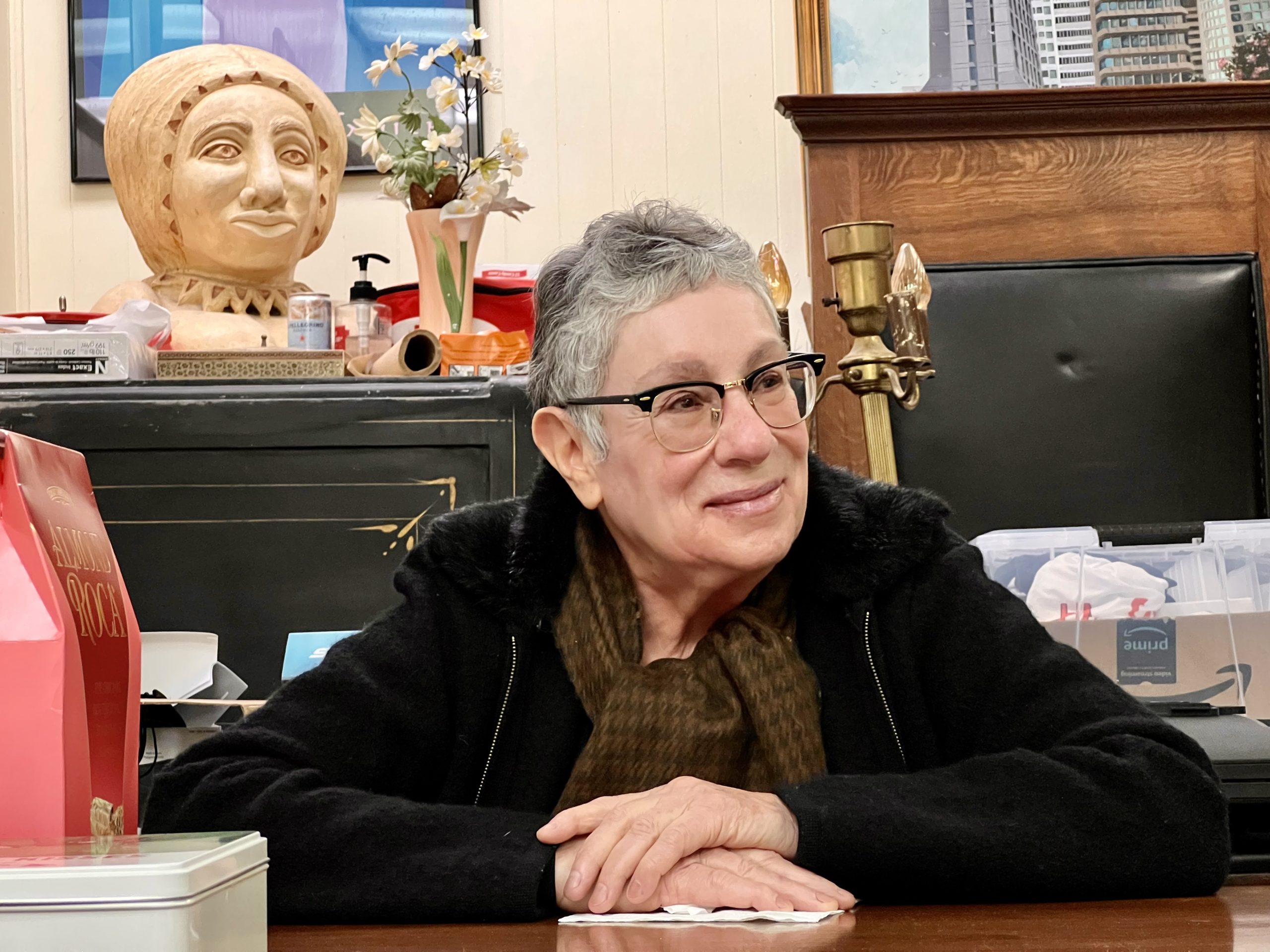
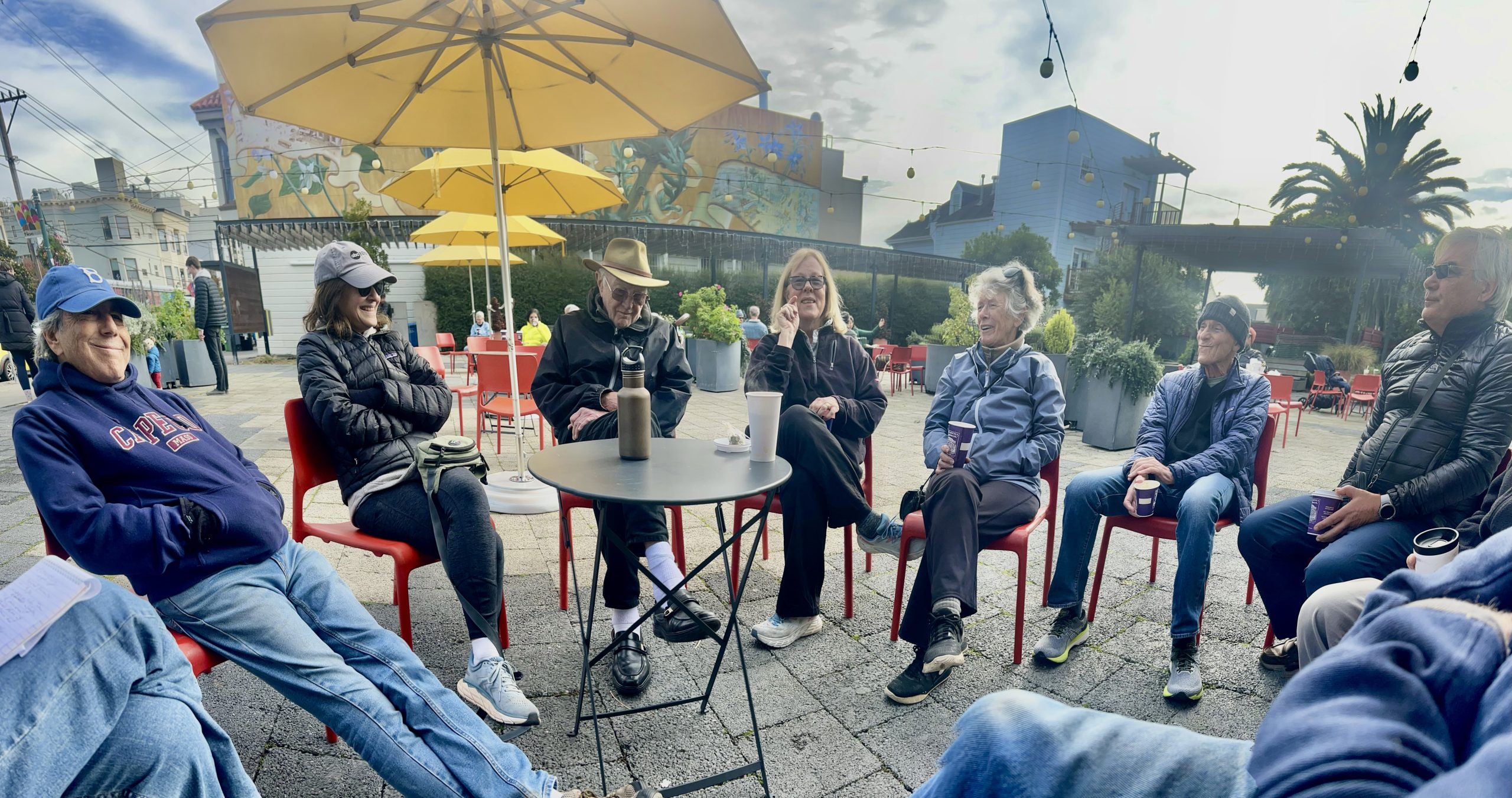
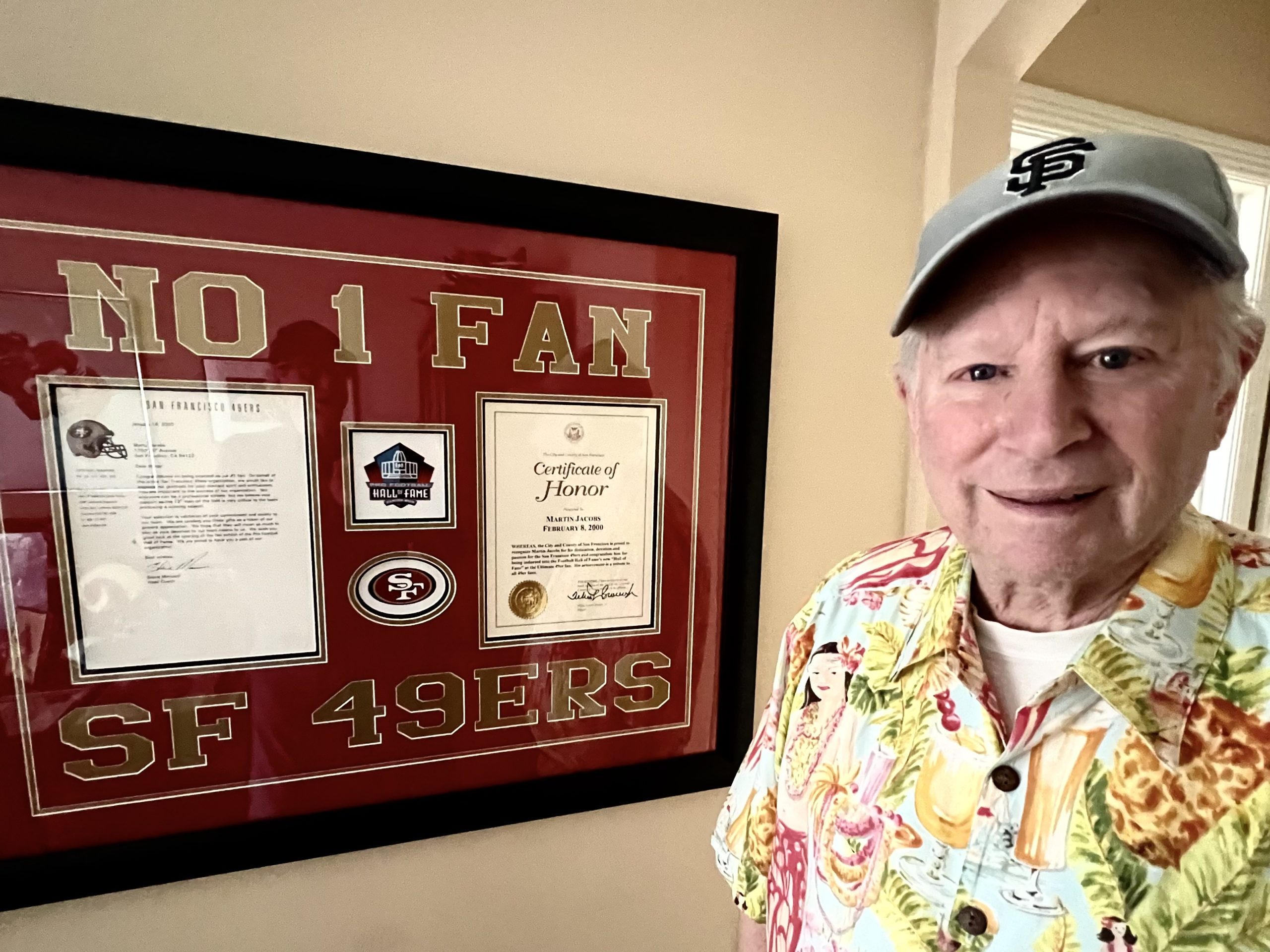
Rose Mary Albujar
Thank you for posting stories like this! It is always nice to read positive and uplifting stories. Please keep posting them.
karin paredes
Great article!!! well done Chad, I am so glad that you never give up. Thanks for sharing.
Hasija Sisic
Wow, very inspirational story. I like how Chad Folkers is not giving up. I'm sure that there are many jobs in nursing field that he can work. I'm hoping that he will find job to work with kids. Writer is great and I would like to see more inspirational and motivational story's like this. Thank you for sharing!!!!
Claudia Vittoria
Great article and inspiring story!!! What a brave soul! I'm preparing for the NCLEX right now and dealing with my own life struggles, and this story was very motivating. Thank you for sharing!!